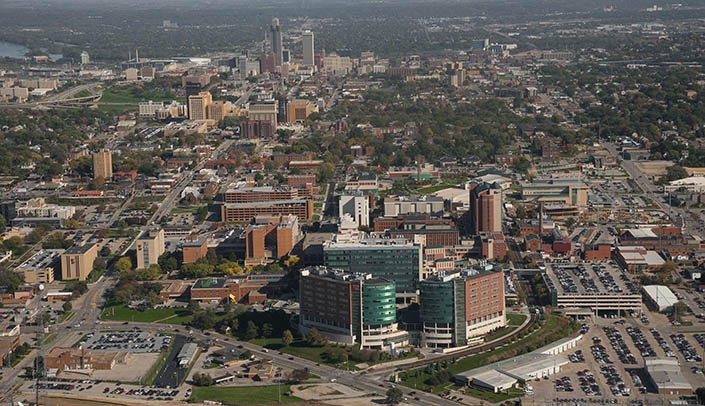The teaching, research and outreach activities of the University of Nebraska grow the state’s economy by $4.5 billion every year, according to an independent new analysis of the university’s significant and far-reaching impact on Nebraska’s growth and prosperity.
The analysis, presented Friday to the NU Board of Regents, was conducted by Tripp Umbach, a leading national consultant with expertise in economic impact studies. Tripp Umbach’s findings, which for the first time detail NU’s impact by region and legislative district, show that the University of Nebraska generates $7 for every $1 the state invests — a return that President Hank Bounds, Ph.D., said demonstrates the vital role the campuses play in ensuring Nebraska’s continued economic competitiveness.
See slides from Friday’s presentation
Particularly as Nebraska aims to address a workforce crisis that includes 34,000 projected annual openings in high-skill, high-wage, high-demand jobs in the coming years, affordable, quality higher education will be essential to Nebraska’s success, Dr. Bounds said.
“We know intuitively that the University of Nebraska is a major force for economic growth and personal well-being across our state. This analysis confirms that Nebraska cannot be successful without its public university,” he said. “From producing the workforce of the future, to expanding opportunities for young people, to sustaining vibrant communities in every county, the University of Nebraska serves as a change agent for Nebraska and its people.”
“I’m proud of the incredible return we provide for Nebraskans’ investment. The bottom line is that when our university is growing, the state of Nebraska is growing.”
Bryan Slone, president of the Nebraska Chamber of Commerce & Industry, said: “The University of Nebraska’s impact on our state’s economy is remarkable. The university is central to building the workforce necessary to keep Nebraska’s economy competitive, and its research capabilities help attract new-growth companies in strategic industries. Simply put, the University of Nebraska is a key partner for the private sector as we build our state’s economic future.”
Among Tripp Umbach’s key findings:
- The university’s $4.5 billion annual impact — an increase from the $3.9 billion impact calculated by Tripp Umbach in 2016 — means that the activities of NU campuses, faculty, staff and students, along with the resulting ripple effects in communities across the state, add more than $12 million to Nebraska’s economy every day.
- The University of Nebraska builds economically and socially vibrant communities, not just in cities where NU campuses are located, but in all 93 counties. Tripp Umbach broke down NU’s impact by both region and legislative district and found significant returns across the state. For example, the university grows western Nebraska’s economy by $230 million annually. Additionally, public-private partnerships like Nebraska Innovation Campus at the University of Nebraska-Lincoln, the Health Science Education Complex at the University of Nebraska at Kearney, Baxter Arena at the University of Nebraska at Omaha and the Fred & Pamela Buffett Cancer Center at UNMC are growing economic activity and quality of life across regions.
- The University of Nebraska sustains a highly skilled workforce for the state, supporting one of every 26 jobs in Nebraska. The nearly 40,000 Nebraska jobs supported by the university include not just NU employees, but those who have jobs as a result of university activities.
- University graduates generate significant economic activity for the state. About one of every seven working-age Nebraskans holds an NU degree, and 11,000 new NU graduates enter the workforce every year. The earnings and spending activities of each graduating class add $2.4 billion to the state’s economy annually, above and beyond NU’s baseline $4.5 billion impact.
- The university is giving students the opportunity to change their lives through education. NU’s campuses educate 52,000 students a year, including many who would not be able to pursue a university degree if not for NU’s affordable tuition rates. About 40 percent of university undergraduates are first-generation.
- NU’s growing research enterprise supports 2,600 jobs, and more importantly addresses key challenges facing Nebraska and the world. The university is a leader in research in agriculture, national defense, early childhood education, health care and other areas.
- The well-being of the state is directly linked to the University of Nebraska. NU employees annually provide $100 million in charitable donations and volunteer services, likes student-led service activities, free health screenings, scholarly lectures and more. The university’s campuses also offer activities that enhance Nebraskans’ cultural understanding and build connections among citizens, including concerts, art exhibits and athletic events.
The university’s annual economic impact by campus follows. Figures do not include Nebraska Medicine and its affiliates and partners; when those are factored in, the system’s impact grows significantly.
- UNL: $2.2 billion
- UNMC: $1.2 billion
- UNO: $716 million
- UNK: $265 million
- NCTA: $11.5 million
A full and detailed report from Tripp Umbach is being finalized and will be published soon.
